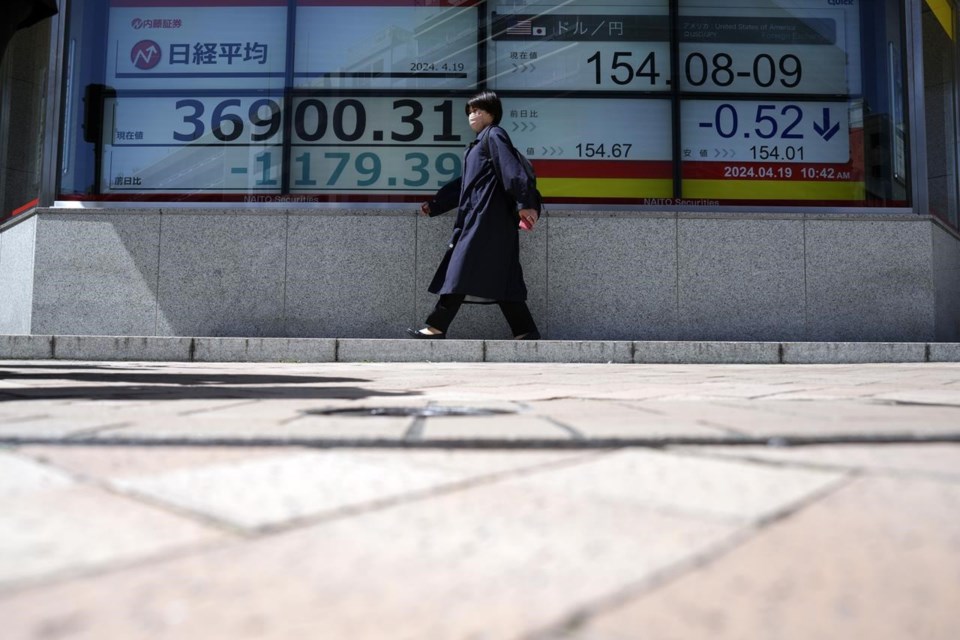HONG KONG — Wall Street’s latest losing week looks to be coming to a relatively quiet close. U.S. stocks are drifting in early trading Friday, and oil prices are easing after briefly jumping overnight. The S&P 500 was 0.1% lower and on track for its third straight losing week. That would be its longest such streak since September. The Dow Jones Industrial Average was up 44 points, and the Nasdaq composite fell 0.4%. Oil prices are edging lower after erasing earlier leaps caused by worries about fighting in the Middle East. Netflix sank after it said it will stop providing quarterly updates on subscriber totals.
THIS IS A BREAKING NEWS UPDATE. AP’s earlier story follows below.
(AP) — Wall Street bounced between losses and gains in early trading Friday after European and Asian markets stumbled with tensions in the Middle East weighing on sentiment.
Futures for the S&P 500 and the Dow Jones Industrial Average rose less than 0.1% before the bell.
Oil prices jumped overnight Friday after the state-run IRNA news agency reported that Iran fired air defense batteries early Friday morning after an apparent Israeli drone attack at a major air base and a nuclear site near the central city of Isfahan. Oil prices reversed course and given up those gains by early morning, however.
Also Friday, S&P downgraded Israel’s long-term credit rating, citing the risk of military escalation with Iran. It is the second major U.S. credit ratings agency to do so. S&P’s downgrade was issued shortly before the strike in Iran, and almost three months after Moody’s, another major U.S. credit agency, downgraded Israel’s rating due to the “ongoing military conflict with Hamas.”
Netflix tumbled more than 5% in off-hours trading after the streamer reported strong financial results and subscriber growth last quarter, but surprised investors by disclosing in a shareholder letter that it will stop providing quarterly updates about its subscriber totals beginning next year. In a video meeting with analysts, Netflix co-CEO Greg Peters said management believes the company’s financial growth has become more meaningful to watch than quarter-to-quarter fluctuations in subscribers.
Stocks have been struggling recently as yields in the bond market charge higher. They’re cranking up the pressure because investors have largely given up on hopes that the Federal Reserve will deliver many cuts to interest rates this year.
Treasury yields came back down Friday after climbing a day earlier on reports that showed the U.S. economy remains stronger than expected. Yields on the 2-year Treasury eased to 4.97% from 4.99% Thursday, while yields on the 10-year retreated to 4.59% from 4.64%.
A string of reports showing inflation has remained hotter than forecast this year have pushed top Fed officials to say recently they could hold interest rates high for a while.
That’s a letdown after the Fed earlier had signaled three cuts to interest rates could be possible this year. But Fed officials have been adamant they want to be sure inflation is heading down toward their 2% target before lowering the Fed’s main interest rate from its highest level since 2001.
In Europe at midday, Germany’s DAX lost 0.5% and the CAC 40 in Paris slipped 0.1%. In London, the FTSE 100 was 0.4% lower.
Japan’s benchmark Nikkei 225 lost 2.7% to 37,068.35, paring losses in the early trading when it plunged 3.5%.
Semiconductor equipment supplier Lasertec was the largest loser, which lost 8.4%. But most other big tech-related shares also dropped. Renesas gave up 6%, Tokyo Electron lost 8.7% and Sony Group Corp. declined 1.8%.
Toyota Motor Corp was down 2.2%.
Japan's headline inflation rate slowed to 2.7% in March, the government reported, while the core-core index, excluding fresh food and energy costs, moderated to 2.9%, marking the first time since November 2022 that it fell below 3%.
The yen was slightly firmer against the U.S. dollar, with the latter falling to 154.55 Japanese yen from 154.64 yen.
The euro rose to $1.0661 from $1.0644.
Markets are waiting for the Japanese central bank’s next move after it raised its benchmark interest rate last month for the first time in 17 years, ending a longstanding policy of negative rates meant to boost the economy. But the rate remains near zero.
Elsewhere, Australia’s S&P/ASX 200 dipped 1% to 7,567.30. South Korea’s Kospi dropped 1.6% to 2,591.86. Hong Kong’s Hang Seng declined 0.9% to 16,231.40, while the Shanghai Composite was 0.3% lower to 3,065.26. Taiwan’s Taiex slumped 3.8%, with Taiwan Semiconductor Manufacturing Co shares tumbling 6.7%.
In oil trading, U.S. benchmark crude rose lost 62 cents to $81.48 per barrel in electronic trading on the New York Mercantile Exchange. Brent crude, the international standard, retreated 60 cents to $86.51 per barrel.
On Thursday, the S&P 500 fell 0.2% to 5,011.12 after flipping between small gains and losses through the day. The drop was slight, but it was still enough to send the index to a fifth straight loss. That’s its longest losing streak since October, and it’s sitting 4.6% below its record set late last month.
The Dow Jones Industrial Average edged up 0.1% to 37,775.38, and the Nasdaq composite slipped 0.5% to 15,601.50.
Zimo Zhong And Matt Ott, The Associated Press



